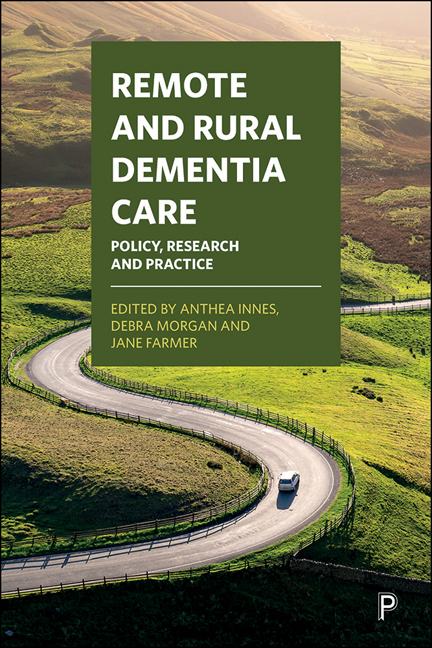9 - Farm-Based Care: Providing Meaningful Activities in Dementia Care as an Alternative to ‘Standard Day Care’ in the UK
Published online by Cambridge University Press: 10 March 2021
Summary
Dementia care is changing. Research on human wellbeing assumes that engaging in meaningful, purposeful activities is essential to maintain a sense of personal control, contribution and independence. Connecting with nature is thought to enhance a sense of wellbeing, although clear evidence of these benefits among those with chronic health conditions, poor mobility and cognitive capacity is less established. What makes for wellbeing among those who are involved in using and delivering rural dementia care? Experiences of ageing, having dementia and/ or being a caregiver are diverse. Understanding this diversity, and especially the fluid intersections where place, personal histories and future needs all converge, is necessary. This chapter examines two forms of care that offer support and care in rural communities in England. Day care generally consists of sessional care that takes places in buildings adapted or designed to accommodate older people. By contrast, farmbased care primarily takes place in the outdoors surrounded by natural connections in mostly rural locations that are not necessarily designed to accommodate older people with dementia. By comparing these two very different contexts, this chapter discusses the possible ways each can adopt perspectives and practices from farm-based care to enhance dementia care in more standard places.
It is well documented that older people living in more rural and remote areas of the UK are vulnerable to rural specific barriers in addition to the barriers associated with declining health and living longer (Bennett et al, 2018). Health barriers in the older population tend to include lowered independence because of reduced physical mobility, chronic pain, anxiety and isolation as a consequence of multiple health conditions (BGS, 2018). Those who live in rural areas are likely to face rurality-specific issues as they age, which can exacerbate the challenges of managing to live with often multiple health issues.
Rural-specific barriers include location issues with housing, transport, digital connectivity, fuel poverty and increased isolation and associated loneliness (Keating, 2009; Alzheimer's Society, 2018). Many of these barriers are masked by attractive ideas of rurality as representative of romantic retirement idylls (Keating, 2009). While many rural regions are indeed beautiful and offer tranquility, they may also be harsh and demanding environments, which can exacerbate the challenges of living independently with a sense of wellbeing.
- Type
- Chapter
- Information
- Remote and Rural Dementia CarePolicy, Research and Practice, pp. 185 - 212Publisher: Bristol University PressPrint publication year: 2020



